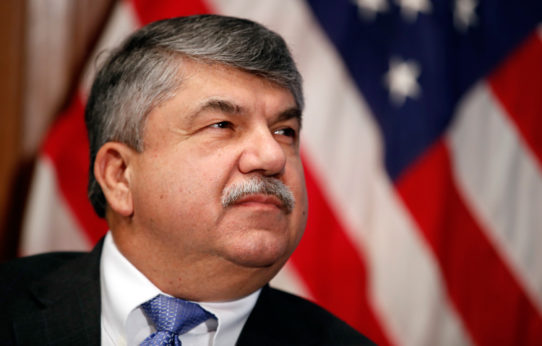
NEW ORLEANS—In speeches and in press releases over the last year, AFL-CIO President Richard Trumka has pointed out that unions are uniquely qualified by their very nature to lead the country out of what he has called a “dark period,” a time when hateful speech and vitriol emanate from the White House and are found in abundance everywhere else. Unions, he notes, bring together all kinds of people in a fight that is common to the vast majority, a fight for a better life for oneself and for the next generation.
The AFL-CIO executive council, including 55 presidents of most of the nation’s unions, are gathering here today a day ahead of the convening of their 2019 Winter meeting. The council, which will run from March 12 thru 14, happens at a time when the majority of voters, Democrats and independents, but even Republicans, are strongly in support of progressive programs. The meeting here comes at a time when Democratic enthusiasm is at an all-time early high for many of the 14 presidential candidates that have emerged thus far for the primaries.
Much of that enthusiasm reflects a country sick of Donald Trump and all the scandals swirling around him. Labor activists gathering here seem to reflect that disgust, coupled with anger, over the president’s constant attacks on labor.
“I voted for Trump last time,” a letter carrier from upstate New York told People’s World, “but never again.” The letter carrier was accompanying his wife who was attending leadership training in another postal union represented here. That situation reflected how some diversity, propelled by the #MeToo movement, has found its way into union leadership. There are several cases this year of husbands who are not union leaders accompanying their wives who are—a reversal of the norm at many of these meetings in the past.
Union leaders here are acutely aware that the first Democratic presidential debate is coming up in May. While no one here wants to be rushed into an early endorsement, everyone is saying labor wants a candidate who will be best for U.S. workers. Many here support the progressive positions Democratic voters back on universal health care, saving Social Security, and on the Green New Deal. Some in the building trades, however, have reservations about the latter program, perhaps fearful of loss of jobs for some of their members.
Many here support the more progressive candidates, among them Sen. Bernie Sanders, Ind.-Vt., Sen. Kamala Harris, D-Calif., and Sen. Elizabeth Warren, D-Mass. Some in the building trades say they prefer former Vice President Joe Biden, who has not yet announced. Biden will be addressing a legislative conference of the Firefighter’s union in Washington Tuesday morning, with some thinking he may use that appearance as an opportunity to announce he is running.
Internal organizing is also very much on the mind of union leaders here. The Janus decision by the Supreme Court severely hurt the ability of the nation’s unions—especially public sector unions—to raise operating funds. It requires unions to represent even those workers who choose not to pay dues to the unions at their workplaces.

From AFL-CIO President Trumka on down, however, union leaders say they will not allow the decision to weaken their resolve. Trumka is telling everyone who will listen that unions never depended on anyone other than workers to survive and that last year alone more than 200,000 workers voted to join various AFL-CIO unions.
Nevertheless, there is expected to be a major push at the executive council meeting this week to get behind and promote labor legislation that will update the National Labor Relations Act and make it easier to unionize.
Trumka has frequently expressed his belief that the plus side during the Trump era is that Americans are seeing collective action as the way to go when they fight for their needs. In a speech in Illinois last October, he pointed to not just unions but to the #MeToo Movement, Black Lives Matter, and the movements of students demanding safe schools as examples of this collective action. He frequently mentions the uprising by workers in Missouri recently “who put right to work for less in the garbage pail where it belongs.”
Unions, he notes, are about more than just better wages. “It’s about everyone, union and non- union—regardless of where they are born, who they love or the color of their skin—coming together to achieve a life of dignity.”












Comments